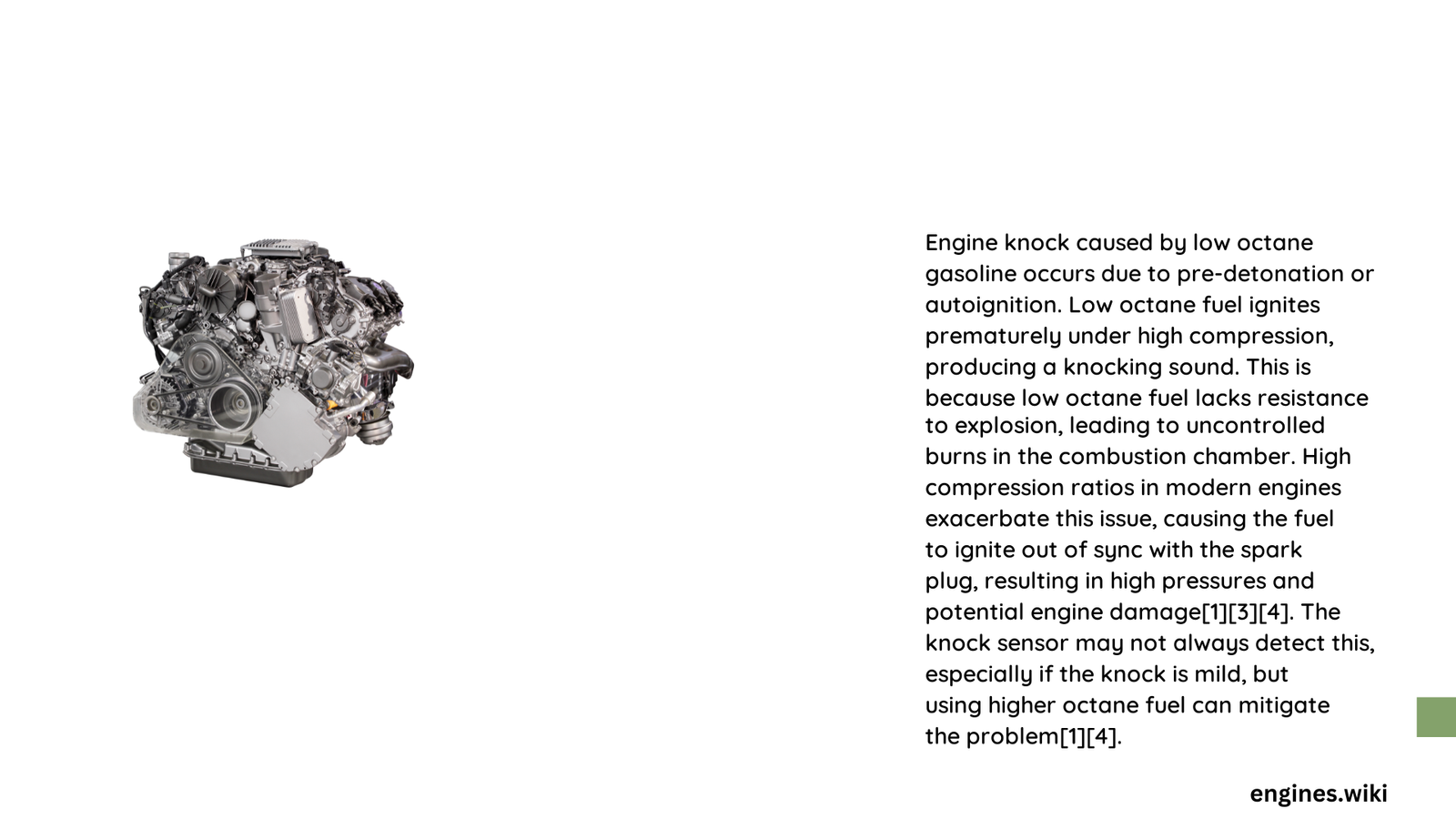Engine knock caused by low octane gasoline represents a serious mechanical threat that can rapidly deteriorate engine components through premature combustion and excessive internal pressure. When lower-grade fuel fails to withstand compression, spontaneous detonation occurs before the spark plug’s intended ignition, creating destructive shock waves within the combustion chamber that progressively damage critical engine parts.
What Causes Engine Knock with Low Octane Fuel?
Low octane gasoline fundamentally lacks the necessary resistance to premature combustion, creating a cascade of potential mechanical failures. The primary mechanisms include:
Combustion Pressure Dynamics
- Premature Ignition: Fuel with insufficient octane rating combusts before the spark plug’s precise timing
- Uncontrolled Detonation: Multiple flame fronts create destructive pressure waves
- Thermal Stress: Rapid temperature fluctuations damage metal components
Molecular Fuel Composition Factors
| Octane Rating | Combustion Resistance | Recommended Usage |
|---|---|---|
| 87 (Regular) | Low | Standard Vehicles |
| 89 (Mid-Grade) | Moderate | Some Performance Vehicles |
| 91-94 (Premium) | High | High-Performance Engines |
What Symptoms Indicate Low Octane Fuel Damage?

Audible Warning Signs
Drivers can detect potential engine knock through:
– Metallic pinging sounds
– Repetitive tapping noises
– Rhythmic knocking at idle or acceleration
– Increased noise during low-speed operations
Performance Degradation Indicators
- Reduced fuel efficiency
- Noticeable horsepower loss
- Inconsistent acceleration
- Check engine light activation
How Can Drivers Prevent Engine Knock?
Proactive Maintenance Strategies
- Fuel Selection: Always use manufacturer-recommended octane rating
- Regular Diagnostics: Conduct periodic engine performance checks
- Quality Fuel Sources: Purchase gasoline from reputable stations
- Timely Maintenance: Replace spark plugs according to vehicle specifications
What Are Potential Repair Costs?
Repair expenses vary based on damage severity:
| Damage Level | Estimated Cost | Potential Repairs |
|---|---|---|
| Minor | $100 – $300 | Spark plug replacement |
| Moderate | $500 – $1,500 | Fuel system cleaning |
| Severe | $2,000 – $5,000+ | Engine component replacement |
Technical Recommendations
Diagnostic Protocols
- Use professional diagnostic tools
- Monitor knock sensor functionality
- Analyze fuel trim and ignition timing
- Inspect combustion chamber conditions
Long-Term Prevention
- Understand your vehicle’s specific octane requirements
- Avoid consistently using lower-grade fuel
- Address knocking sounds immediately
- Maintain regular vehicle servicing
Expert Insights
Professional mechanics emphasize that persistent engine knock can cause catastrophic damage, potentially requiring complete engine replacement. Early detection and intervention are crucial for maintaining vehicle longevity and performance.
Conclusion
Engine knock caused by low octane gasoline represents a preventable yet potentially devastating mechanical issue. By understanding fuel requirements, recognizing symptoms, and maintaining proactive vehicle care, drivers can significantly mitigate risks associated with improper fuel usage.
